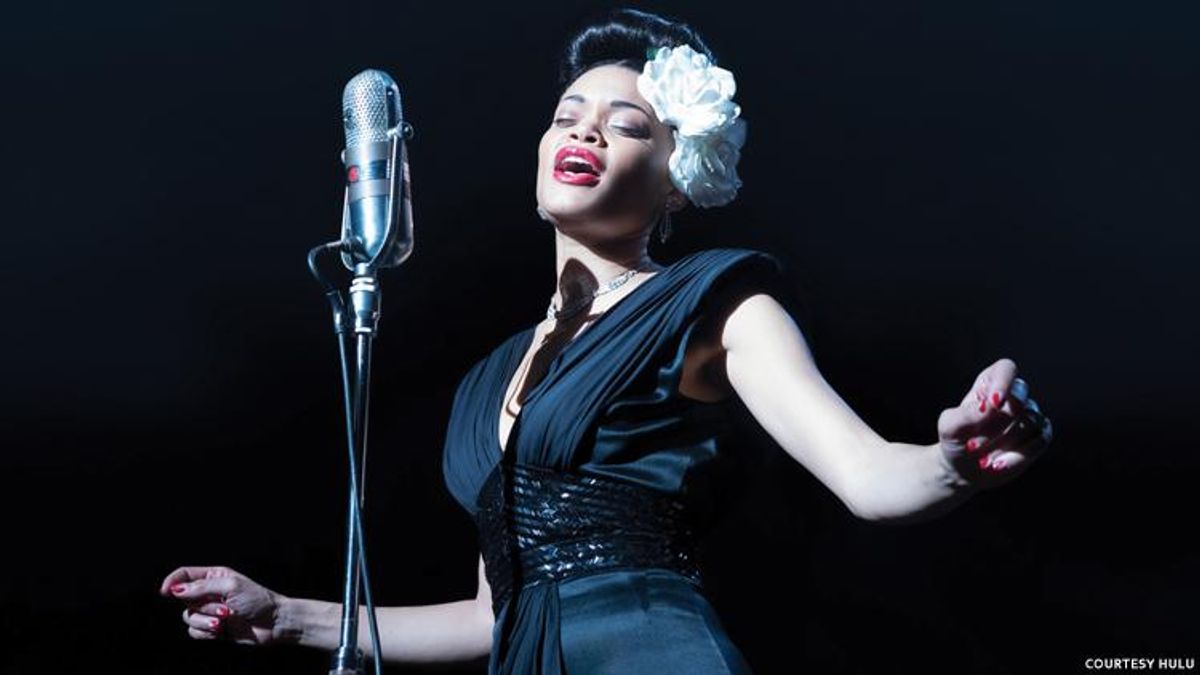In 1948, blues legend Billie Holiday was released from a stint of several months in a federal penitentiary. She had been imprisoned, allegedly for her drug use, but in reality on a drummed-up charge aimed at silencing the woman who dared to sing about the lynching of Black Americans in "Strange Fruit."
Now, 73 years after her release, Lee Daniels's The United States vs. Billie Holiday, out on Hulu on February 26, takes on the prescient story of the racism she endured while also highlighting her resilience as a Black bisexual woman in postwar America.
Starring a riveting Andra Day (in her first film role) as Holiday, the movie celebrates Holiday's artistry and singular voice, while also delving deep into the FBI-led plot -- spearheaded by Harry Anslinger, the first commissioner of the Federal Bureau of Narcotics -- to quash the early civil rights icon.
[[{"fid":"1966663","view_mode":"default","fields":{"format":"default","field_file_image_alt_text[und][0][value]":""Strange Fruit" and Billie Holiday's Persecution Get Their Due in Lee Daniels's Film","field_credit[und]":""},"type":"media","field_deltas":{"1":{"format":"default","field_file_image_alt_text[und][0][value]":""Strange Fruit" and Billie Holiday's Persecution Get Their Due in Lee Daniels's Film","field_credit[und]":""}},"attributes":{"alt":""Strange Fruit" and Billie Holiday's Persecution Get Their Due in Lee Daniels's Film","class":"media-element file-default","data-delta":"1"}}]]
"What terrified them [the FBI] about her was that she had power," Day tells The Advocate. "When they interviewed people who had watched her perform back then, [those people] talked about her magnetism and how she would draw people of all colors, of all races and genders, to her. People were enamored by her and by her voice. When she would perform you could hear a pin drop."
Holiday began singing "Strange Fruit," written by poet and songwriter Abel Meeropol under the name Lewis Allan, in the late 1930s. As happened in real life and is depicted in the film, Anslinger (Garrett Hedlund) orders Holiday to stop singing the song, claiming that it "incites violence." When she refuses, he sends in an agent, Jimmy Fletcher (Moonlight's Trevante Rhodes), to set her up and nail her for drug use.
"Anslinger was terrified by Billie because he was a racist. He could not understand the power of this Black woman and her song 'Strange Fruit' and the effect that it was having on America," Daniels tells The Advocate. "Billie was a combination of Cardi B meets Beyonce of that generation. Could you imagine the cops coming for her?"
The United States vs. Billie Holiday spans the 1940s to her death in 1959. While the plot against her is its central story, the film also depicts her passions for music, love, and sex. Day, who's known widely for "Rise Up," an inspirational anthem that seamlessly fits into Billie's story, is more than up to the job of taking on the legend whose music she's studied since childhood. Of his star, Precious director Daniels says, "Casting Andra Day was magic.... Billie's spirit lived in her."
"I was 11 or 12 when I first heard her voice and I was introduced to her by my musical theater teacher," Day says. Among the first of Billie's songs she recalls taking hold of her consciousness were "Sugar," "Your Mother's Son-in-Law," and of course, "Strange Fruit."
"I was so moved by 'Strange Fruit' because it was, really, the first time I had really listened to a song and been like, Oh, man, this has so much purpose," Day says.
Similarly, "Strange Fruit" impacted Daniels, who says he didn't fully grasp the gravity of the song until he was in his 40s. "It left me speechless," he says. So, when the Pulitzer Prize-winning playwright of Topdog/Underdog, Suzan-Lori Parks, presented her screenplay based on Johann Hari's novel to him, Daniels was on board.
"I had no idea the government was on Billie in such a dogged way. That is what I think intrigued me the most," he says of what drew him in.
But it was also critical to Daniels to highlight Billie's multifaceted life. The film focuses on something of a love triangle between Billie, Jimmy, and her volatile husband and manager, Louis McKay (Rob Morgan), but it also highlights her ongoing relationship with actress Tallulah Bankhead, played by queer icon Natasha Lyonne.
"It's important to show Billie as a multidimensional human being. Her bisexuality was as important for me to depict as was her kicking off the civil rights movement with her song 'Strange Fruit,'" says Daniels. "It was also important for me to show the multidimensional life of an artist. Of a singer. Of a Black woman. Of a bisexual Black woman. Of a Black woman that was fighting the system to sing a song."
A pivotal scene in the film features Tallulah taking Billie up to her hotel room for a tryst, but the elevator operator (who is Black), per Jim Crow laws, refuses Billie's entrance to the rooms through the front. She's told to take the service elevator.
"She was kept out of the elevator by one of her own people doing his job.... People don't truly understand how deep racism is and how intentional it is and how it's designed even to color the perspective of other people of color or other marginalized people, like queer people," Day says.
"The more we can make an effort to understand and empathize with each other's struggles and overcomings and victories," Day adds, "I think that's how we become more of a healthy and whole society."













































































